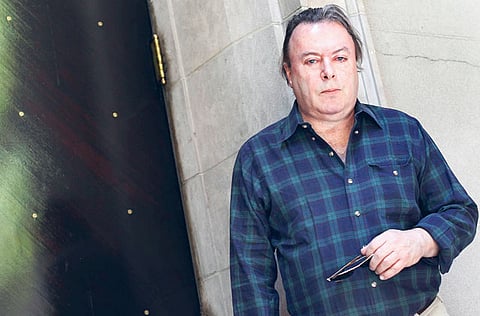The polemicist
Christopher Hitchens considers it a defeat to lose an argument

I have arranged to meet Christopher Hitchens at Paddington at 10.45am and, according to my watch, that was two minutes ago. I am to accompany the 61-year-old author and journalist on the train because, as he says, it will be "a nice prompt for reminiscence". He has a tight schedule: lunch with Richard Dawkins at Balliol, their old college, followed by a reception in the afternoon and a debate on atheism versus religion at the Sheldonian in the evening.
A couple of years ago he took American citizenship, having lived there for a quarter of a century, and he still likes to fly off to war zones and "difficult countries" to file dispatches and/or find inspiration for his polemical essays and books. And as he reveals in his latest, a pert yet elegantly written memoir called Hitch-22, he has been roaming the globe, looking for trouble, all his life. The Hitch, as he is known, does self-parody well. He plays up to the Hitch image a little — the cool, louche, tousle-haired, twice-married street fighter. According to his closest friend, Martin Amis, he "likes the smell of cordite" and is always on the prowl for an argument.
With the sound of woodpigeons and church bells in the background, I ask about his childhood stutter. It went away but the idea that the ferociously fluent Hitch could have been vulnerable in this way is intriguing.
Are there any other insecurities we should know about? "Money. Never had enough growing up. And I'm full of self-loathing that I don't speak another language well. And I would have liked to have run for a seat in Parliament. Think less of myself for not doing it. I don't have any terrific self-esteem issues but I do sometimes realise I've been too lucky and that I'm over-praised. It makes me nervous. I have this sense of being overrated. Another insecurity is that I never like to lose an argument, even a domestic one. Even when it might not matter."
Does that make him difficult to live with? "It must do. In fact, I know it does. It's a vice." What is wrong with losing an argument? "What a question! I would feel it was a defeat." Although he often uses humour as a weapon, he can turn nasty, go into flame-thrower mode.
Politically he considers himself an advocate of secular liberalism. Others describe him as a contrarian, a term he doesn't much care for. Either way, he was, and is, a formidable advocate of the war on Iraq and this has left him as something of a punch bag on the internet. Not that he cares. He does feuds well.
"You must tell me if I am being boring. You must be blunt with me." Fear of boring people, and people boring him, has been the driving force in his life, he reckons. It is also what makes him so readable, although it wasn't until his last book that he enjoyed a commercial success.
To what extent has his life been a reaction against his father? After all, his father was taciturn, he is garrulous. "The Commander", as his father was known to his sons, would gather the family together every Boxing Day to toast the sinking of the German battleship Scharnhorst, an action he had been part of.
He identified more with his mother than his father. "My brother is much more like my old man, though you can't really describe Peter as taciturn."
Indeed not. Peter Hitchens is also an award-winning author and journalist. In public, the sibling rivalry between them has been on a grand scale but actually they are more alike than different. Both extremely argumentative, both started out as Trotskyites. Now one is a Right-wing Leftie, the other a Left-wing Rightie. They often disagree on politics but their real difference is over religion, Peter being a devout Anglican.
We set off for Balliol. Dawkins is waiting for him outside Balliol. Both are wearing sunglasses. The atheist mafia. That evening, at the debate, I watch Hitchens as he waits to speak, rotating his foot at the ankle like a cat about to pounce. He soon gets the audience on side, making them laugh, then cheer. As Dr Johnson was said to do, so Hitchens does. He tosses and gores his opponent, a desiccated professor who never stood a chance. He slurs not one word. On my way home, I remember that he signed my copy of his book. I open it up and smile to myself: "Well met on the 10.50 to Oxford."
Sign up for the Daily Briefing
Get the latest news and updates straight to your inbox

